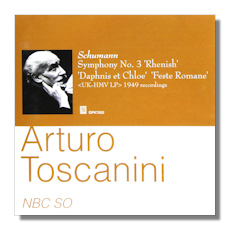
The Internet's Premier Classical Music Source
Related Links
-
Ravel Reviews
Respighi Reviews
Schumann Reviews - Latest Reviews
- More Reviews
-
By Composer
-
Collections
DVD & Blu-ray
Books
Concert Reviews
Articles/Interviews
Software
Audio
Search Amazon
Recommended Links
Site News
 CD Review
CD Review
Toscanini Conducts

- Robert Schumann: Symphony #3 in E Flat Major "Rhenish", Op. 97
- Maurice Ravel: Daphnis et Chloé (Suite #2)
- Ottorino Respighi: Roman Festivals
NBC Symphony Orchestra/Arturo Toscanini
Opus Kura OPK7052 71:05
Three of the Maestro's greatest late recordings on one disc makes an ideal program for continuous listening. Recorded in 1949, these three performances are all excellent in their own way. While Respighi is a composer with which Toscanini was often associated, his work with Ravel and Schumann is less readily available. Make no mistake, the conductor was equally at home in French music and the German classics.
Despite ample evidence that Toscanini favored driven tempos, this "Rhenish" is mostly unhurried and mostly fabulous. The engineering is nothing special, but the NBC Symphony overcomes the dry acoustics of Studio 8H and the generally unsmiling outlook of the conductor. Regardless of sonic quality, Toscanini gives us one of the least droopy Schumann recordings of his era (or our era, for that matter) and there are all kinds of pleasing instrumental details that are clearly missed by lesser conductors. In an interesting move, writer Satoru Aihara speaks unkindly of both the sound and performance in his liner notes, but I recall fondly the conductor's Schubert performances in listening to this noble and occasionally intense rendition.
The remaining two items were captured in Carnegie Hall, and sound quite a bit better. Sonically, the Ravel is the best item on the disc. In fact, it's one of the most vivid Toscanini items I've ever heard. This is still 1949, and some of the composer's carefully planned orchestral effects are inevitably lost. However, the NBC forces play splendidly, with tremendous virtuosity and real attention to detail. Toscanini's Debussy was always a treat, and his Ravel is equally fine. Clear, and with no trace of impressionistic fuzziness, the great man builds the Suite masterfully. Particularly impressive are the first-chair winds and the way in which as many details as possible remain audible.
As for the Respighi, it's a fine performance, too. Toscanini always served the composer well, though his Pines of Rome and Fountains of Rome were recorded later and sound better. The whole trilogy remains competitive in a sense, though stereo sound is to be preferred in these showpieces. The RCA sound has been lovingly restored by Opus Kura, and this remains one of the best offerings from Opus Kura devoted to this giant of conducting.
Copyright © 2015, Brian Wigman




















